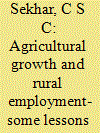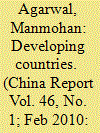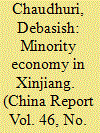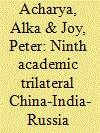|
|
|
Sort Order |
|
|
|
Items / Page
|
|
|
|
|
|
|
| Srl | Item |
| 1 |
ID:
103676


|
|
|
|
|
| Publication |
2010.
|
| Summary/Abstract |
The present paper argues that there is an absence of a clear policy of rural industrialization in India to absorb labour from agriculture that can help increase labour productivity and improve rural incomes. Agricultural growth, combined with clear policy of rural industrialization, is important for an equitable rural-urban growth. To this end, equitable land distribution, rural infrastructure and services, human capital development (literacy and health) and governance are very crucial-in the attainment of all of which China attained a fair degree of success. Therefore, these are some of the lessons that Indian policymakers may take from the Chinese model of rural development.
|
|
|
|
|
|
|
|
|
|
|
|
|
|
|
|
| 2 |
ID:
103681


|
|
|
|
|
| Publication |
2010.
|
| Summary/Abstract |
This paper examines five issues: 1) Recent performance of developing countries in terms of growth, investment and integration with the world economy; 2) The impact of the crisis on these economies; 3) The response of policy makers in these economies to mitigate the adverse impact, in particular, the nature of the stimulus packages implemented in these economies; 4) The role developing countries can play in the recovery of the world economy; and 5) The role of China in the recovery, and, in particular, how to deal with the bilateral imbalance between the US and China. Special attention is paid to the behaviour of the economies of the developing country members of the G20 (DG20).1 Finally, the paper discusses what the crisis has revealed about the interests of Russia, India and China in the world economy and consequently a possible strategy for the G20 which would serve their interests.
|
|
|
|
|
|
|
|
|
|
|
|
|
|
|
|
| 3 |
ID:
103673


|
|
|
|
|
| Publication |
2010.
|
| Summary/Abstract |
The characteristic feature of the geo-economic space of the People's Republic of China is that 70 per cent of the minority population of the country is concentrated in its western region. The uneven development of the early reform period mostly affected the minority-populated areas. China's westernmost administrative division Xinjiang Uyghur Autonomous Region (XUAR) is one such region which has been restive since 1990 due to an ongoing separatist movement led by Uyghurs, the majority ethnic group of the region. Alongside the regional imbalances in economic development during the reform period, due to geographical as well as historical factors, and long-term policy, a phenomenon of localized economic development has emerged that marginalized the minorities of Xinjiang to a great extent. The paper focuses on the intraregional economic disparities of the region and the economic deprivation of the Uyghurs.
|
|
|
|
|
|
|
|
|
|
|
|
|
|
|
|
| 4 |
ID:
103678


|
|
|
|
|
| Publication |
2010.
|
| Summary/Abstract |
The Ninth India-China-Russia Academic Trilateral Conference was held in New Delhi from 7th to 9th December 2009. With this Conference, the third round of the trilateral exchanges which had commenced in Moscow in September 2001 came to a close. This trilateral academic exchange involves the following institutions from the respective countries-the China Institute of International Studies (CIIS), Beijing, the Institute of Chinese Studies (ICS), Delhi and the Russian Academy of Sciences (RAS), Institute of Far Eastern Studies (IFES), Moscow. The Ninth Conference was preceded by the BRIC (Brazil, Russia, India and China) Summit at Ekaterinburg in June 2009 and by the ninth meeting of the foreign ministers of China, India and Russia in Bengaluru, India in October 2009.
|
|
|
|
|
|
|
|
|
|
|
|
|
|
|
|
| 5 |
ID:
103672


|
|
|
|
|
| Publication |
2010.
|
| Summary/Abstract |
Anniversaries are occasions for celebration and for taking stock of past problems as well as successes as a basis for looking ahead. But it is important to acknowledge first the enormity of the achievements of the People's Republic. The sixtieth anniversary has been marked in Beijing by a display of China's military strength and its wealth. The "sick man" of Asia of a century ago has been transformed into one of the world's economic power-houses. Hundreds of millions of people have been lifted out of poverty. The Chinese economy ranks as the largest in the world. It has become one of the world's greatest trading nations and its influence is growing in every continent. However, in assessing the significance of these sixty years this paper will focus on three themes: history; foreign relations and future prospects.
|
|
|
|
|
|
|
|
|
|
|
|
|
|
|
|
| 6 |
ID:
103680


|
|
|
|
|
| Publication |
2010.
|
| Summary/Abstract |
The United States is in a unique position today of leading without a remotely credible challenger anywhere in the world (akin to the leadership challenges of the kind the Soviet Union posed during the Cold War, or the great powers did to each other until 1945). Accordingly, enemies have to be manufactured in order to convince the rest of the world to remain in line, and that must always generate instability and conflict. The threat to world peace lies in the American capacity and compulsion to lead the world and a virtually worldwide demand that it should do so. Multipolarity is neither more rational nor necessarily preferable, despite its apparent attractions. The Trilateral must insert itself strictly within these circumstances thus obtained.
|
|
|
|
|
|
|
|
|
|
|
|
|
|
|
|
|
|
|
|
|